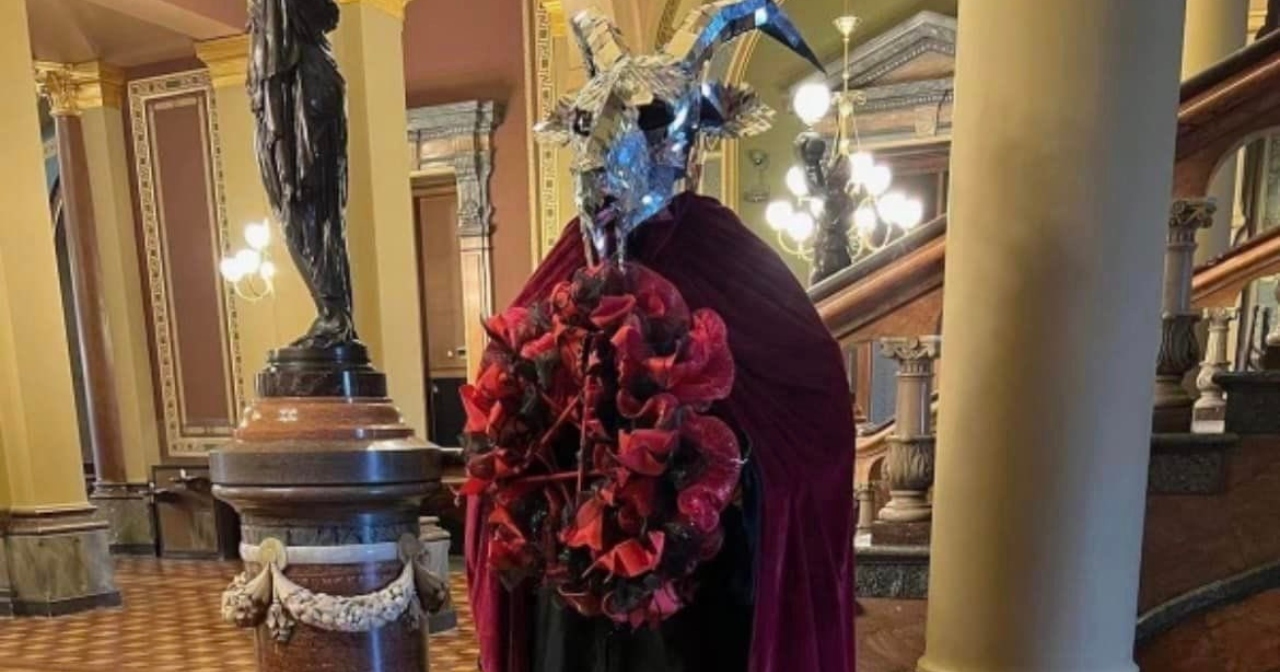Satanic display in Iowa State Capitol stirs debate among GOP lawmakers: 'Outrage and disgust'

A satanic exhibit in the Iowa State Capitol has caused a stir among Republican state lawmakers who are debating the legal necessity of allowing such displays on state property.
An organization describing itself as The Satanic Temple of Iowa erected an altar depicting a silver ram’s head on a mannequin adorned with a red cape and surrounded by candles and flowers, according to local KKCI Des Moines. The statue also holds a red wreath with an inverted pentagram.
Iowa state Rep. Jon Dunwell, a Republican and Christian pastor who also serves as assistant majority leader, told The Christian Post that while he disagrees personally with what the display represents, he doesn't believe the government should be getting involved.
"For me, I would rather have an evil, blasphemous display or no display at all than have the state dictate what they think is appropriate," he said.
Dunwell's comments to CP echoed a thread he wrote on X explaining his position on the satanic display. The thread garnered millions of views on the platform over the weekend and prompted criticism from some who suggested he wasn't opposing it forcefully enough.
As many of you have become aware, last week a display was erected at the Iowa Capitol by the Satanic Temple of Iowa. As I have responded to concerns from Iowans about the display, I wanted to share with you how the display came to be and my response.
— Rep. Jon Dunwell (@jdunwell) December 8, 2023
How did it happen?
• The… pic.twitter.com/8ODJXCxu9Y
Dunwell explained in the thread that The Satanic Temple had applied for the display in August, and that the Iowa Legislature's Department of Administrative Services (DAS), which governs the displays, does not discriminate on the basis of religion or ideology. He also claimed that the original plan for the display to feature a goat skull was denied.
Dunwell pushed back against any accusation that his position is radical, telling CP that he believes "the [government] would not be a good arbitrator of what is an appropriate religious expression, and what is not appropriate religious expression."
"And that's the danger when you begin to inflict restrictions upon freedom," he said.
Dunwell described himself as "a Bible-believing, crazy Evangelical Christian," but said that while he brings his faith and everything else about him to his role as a legislator, he doesn't believe it's his job to impose his faith on anyone else.
"I have the freedom to express [my faith] and freedom to talk about it," he said. "It influences my decisions, but it is not something that I say, 'You have to have my faith, and only my faith can be expressed.'"
While Dunwell said he believes a day is coming "when every knee will bow and every tongue will confess that Jesus Christ is Lord," he also said that day is in the future and that Christians are not called to establish His kingdom politically in the meantime.
"I am nervous about government interfering with religious expression, even religious expression I may disagree with," he said, adding that many of his Christian friends and constituents agree with him that there is "nothing to fear" about the satanic altar, which he dismissed as "an inanimate object."
"Though this is uncomfortable, and though this may be [what] even some would call blasphemous toward our faith, the reality is God is bigger than this," he said. "And we have the ability to stand against this spiritually, and we have the ability to express our ideas about it, but we don't need to live in fear of it, or get all angry and behave in an un-Christian way because someone does something we disagree with."
Dunwell's fellow state Rep. Brad Sherman, who is also a Republican and a pastor, took a different view on the topic, arguing in a newsletter last week that there is potential legal recourse by which satanic displays could be prohibited on state-owned property.
"The outrage and disgust for this satanic display is widespread, but few people think there is much that can be legally done about it because of free speech and freedom of religion," Sherman wrote. "However, I disagree."
Citing the preamble to the 1857 Iowa State Constitution, which established the state on the basis of a belief in a "Supreme Being" and "dependence on Him for a continuation of those blessings," Sherman described any legal interpretation that would afford Satan and God the same religious expression as "twisted and tortured."
"Such a legal view not only violates the very foundation of our State Constitution, but it offends the God upon whom we depend and undermines our wellbeing," Sherman argued.
He also said that civil magistrates are not exempt from obedience to God, and that they "must submit to Him in government as much as any other area of life."
"Either He is God or He is not," Sherman added.
Claiming that it violates the Iowa State Constitution, Sherman called on Republican Iowa Gov. Kim Reynolds to remove the "blasphemous display." He also called for the adoption of "clarifying legislation" that would prohibit satanic displays on state property and allow the Ten Commandments.
CP has reached out to Sherman's office for comment.
Andrew T. Walker, who serves as associate professor of Christian ethics at The Southern Baptist Theological Seminary, echoed Sherman's sentiments in an op-ed for World magazine, arguing that there are potential limits to constitutional freedom, and that there is neither a theological nor a political basis for allowing satanic displays on government property.
"Constitutional analysis is determined through legal tests of adjudication, and no right is absolute," Walker wrote, noting how even English philosopher John Locke — whose theories helped frame American political thought — argued that atheism was a threat to public order and should not be tolerated.
"To think that raising questions about the limits of constitutional rights is somehow scandalous and illegitimate in itself is to misunderstand constitutionalism," Walker said. "Constitutionalism is a social pact for agreed-upon cooperation. For good or for ill, depending on the question at hand, every constitutional order is guided by some explicit or implicit limiting principles."
Walker argued that limits could potentially be placed on satanic displays on government property based on questions such as whether Satanism meets the definition of a traditionally understood religion, whether a reasonable person would see it as a civic and moral good, or whether a reasonable observer would view satanic displays as serving to "advance a prurient purpose."
"Satanism, whether real or pretend, is an outright celebration of evil, darkness, and perversity," Walker wrote. "So, in my view, there should be no Satanic displays in government buildings. Yes, even a Baptist can say such things."
Satanic Temple co-founder Lucien Greaves told the Des Moines Register that the display is not intended to be a dig at Christians, and that the government should not be dictating what religious displays are permissible.
"People assume that we're there to insult Christians and we're not," Greaves told the outlet. "And I would hope that even people who disagree with the symbolism behind our values, whether they know what those values [are] or not, would at least appreciate that it's certainly a greater evil to allow the government to pick and choose between forms of religious expression."
Satanic mockeries of Nativity scenes have made headlines in recent years in places such as neighboring Illinois, where in 2021, members from that state's chapter of The Satanic Temple installed a statue of baby Baphomet swaddled in a manger in the Illinois State Capitol rotunda. Another year featured a “Snaketivity” statue depicting a serpent coiling around Eve's hand to offer her the forbidden fruit.





























